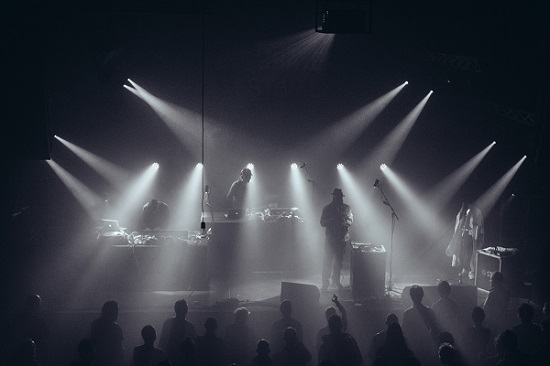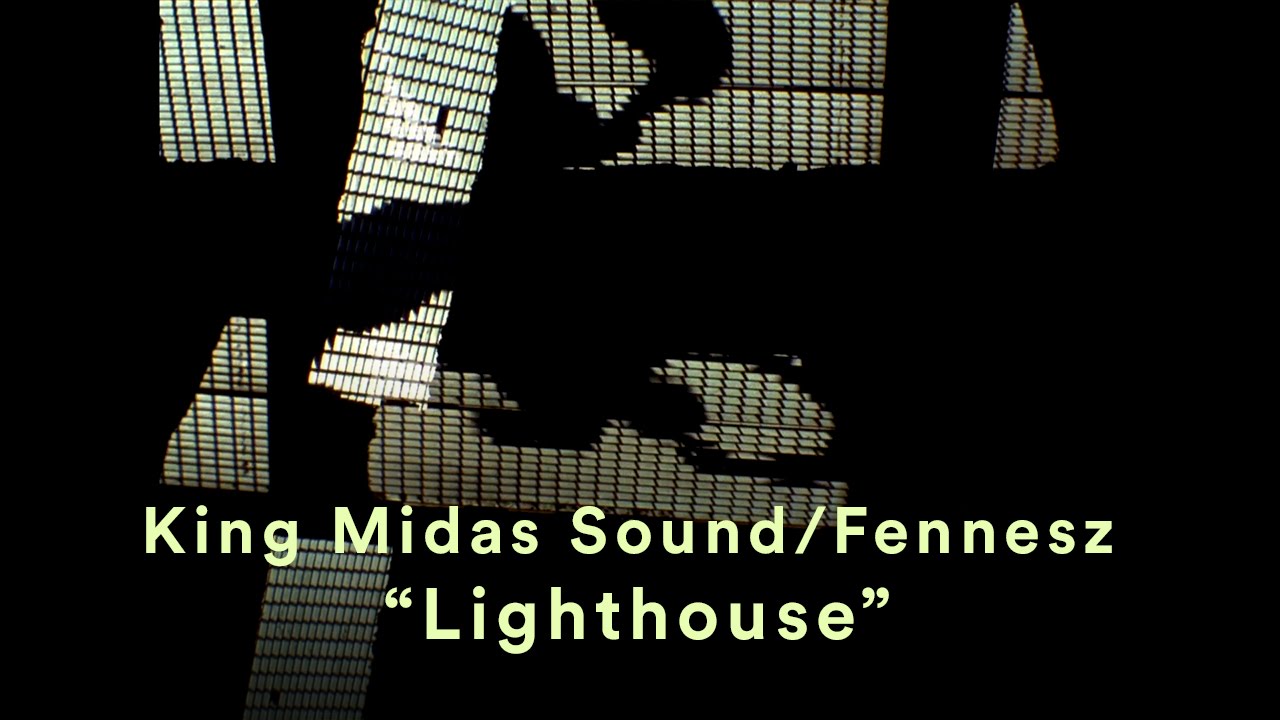All pictures courtesy of Jordy Koppen and Incubate Festival
What was the rain like when you were young?
Roger Robinson: I grew up in Trinidad where we have a dry season and a wet season. When I was primary school-aged, we used to strip off down to our underpants and run out into the rain. You’d meet everyone in the street, boys and girls, and say, “Yeah, it’s raining!” And your parents would bring you a bar of soap. So if you were in the rain you’d just bathe. It was what’s called white rain. You know, those heavy, heavy drops where you’re just drenched in seconds? But here’s the interesting thing: they can’t do that in Trinidad now because of pollution. But when I was a kid the rain was heavy, warm and safe.
Kiki Hitomi: In Osaka, Japan, the rainy season is around a month long, is very humid and comes just before Summer hits. So we’re talking early June and then it rains every single day. Maybe your bathroom or even your whole house gets mouldy because of the humidity. When we were young we used to enjoy staying inside. I didn’t go out into the street and wash myself! I would sometimes play with snails when it rained. But it was good because when it rained it meant we could expect the hot, hot summer that would follow and a one month holiday from school. So really it was just a precursor of the summer to come.
Kevin Martin: I have a much more depressing, prosaic relationship with the rain. All I can think is that rainy days equalled boring, depressing, greyness. They always felt like the longest days ever. And to this day I can’t put a positive spin on it; rain or wasps. I grew up in Weymouth which is a seaside town so it’s quite rainy anyway. It was a very schizophrenic town. It did get quite sunny in summertime but then it was also infested by tourists from Birmingham and Wales. During those months it was very, very vibrant. But then in the winter time it was like a ghost town. All the cafes and restaurants were seasonal so everything shut up shop. So basically I equate rain with a miserable season of nothingness.
Christian Fennesz: I like rain. I like the sound of it. I grew up in Austria, an hour away from Vienna near this huge lake at the Hungarian border. And there was always rain and there was always wind. There was always the sound of water. The rain is a constant part of my childhood memories.
When King Midas Sound and Christian Fennesz drive into Tilburg on Friday afternoon, the heavens open unexpectedly. I am on my way to meet them when dark clouds suddenly roll across the sun and there is a convulsion of precipitation; a diluvial spasm that sees me drenched before I have time to even wonder at the marrowfat pea-sized raindrops exploding onto pavements. Bemused looking Dutchmen and Dutchwomen shelter in shop doorways and huddle under bus stops with their bikes and shopping bags but I’ve got an appointment to keep and don’t have the luxury of taking cover. By the time I get to the nearby venue where the musicians are loading in, I’m soaked to the skin and water has pooled inside my Adidas Trimm Trab.
Together the forward-facing lovers’ dub trio and the Austrian guitar savant form one of the stellar attractions at this year’s peerless Incubate Festival; they are a clear highlight on an already exceptionally heavyweight bill. But by the time I actually negotiate entry to the venue and walk into the dark cavern of the Midi venue I immediately start to doubt the show will take place. Only Kevin Martin is on stage. I can make out his figure – or rather I can see a beard under a baseball cap bib and raised hood leering out of the dark – hunched behind banks of equipment with blinking green and red lights flickering in the pitch dark. By the position of his head I guess he is looking directly at a huddle of shadowy figures, all wearing headsets, talking softly in Dutch to one another by the sound desk at the back of the hall. For a second I fancy I can see the flash of fire-red eyes glowing angrily under the lowered baseball cap on stage. I don’t even bother announcing my presence – it’s obvious what’s going on. I walk back out of the venue into the rain, the pools of water inside my trainers squelching with every step.

The stand off is over volume. King Midas Sound have a lengthy technical rider with detailed specifications of their set, which include the peak level at which they will be playing – 115db. With only hours to go, the venue’s sound staff are refusing to let the group play at anything over 104db (1db above Dutch law – the equivalent of driving at 77mph on a British motorway). Not only this, the staff have all threatened strike action, meaning that either KMS play quietly or Incubate will lose the venue and shows by East India Youth, Helena Hauff, Wire, Terakaft and Kerridge among others will be cancelled.
This stand off is nothing new. King Midas Sound’s debut headline gig in London was supposed to take place at a newly renovated Bishopsgate Institute at the end of January 2012. Such was the volume at soundcheck that dust (which had been gathering in the rafters of the stately City Of London building since the same year Oscar Wilde was arrested for gross indecency at the tail end of the 19th Century) was disturbed and dislodged in sufficient quantities to set off silent alarms in the building. By the time I got to the venue at opening time, fire engines had closed off Bishopsgate – the main traffic artery running through London’s square mile – in both directions and King Midas Sound had already left, refusing to compromise on the issue of volume. In fact, if memory serves correctly, exactly the same thing happened the last time Kevin Martin came to Tilburg for Incubate a few years previously.
(Roger Robinson – while always fiercely loyal – simultaneously laughs and groans if you bring up the subject of Martin and his relationship to sound men. He jokes that he is working on a film: “It will just be made up from scenes of Kevin talking to sound men in lots of different venues in various countries. It will play in every art house cinema in the world. It will be a massive hit. And it will not be a short film. It will be a very long film…” In May Robinson and I shared a stage at a music and spoken word event. After the show, he introduced me to an ex-member of GOD – Martin’s late-80s industrial noise group. The first words out of his mouth were: “Is Kev still shouting at sound men?”)
The show goes on because it must. I don’t know how an agreement is reached but at 10.15pm, the quartet walk on stage. They are performing together for the first time. Hell, this is the first time that all of them have been in the same building together. They have just released the excellent Edition 1 LP on Ninja Tune – an album which was recorded by remote collaboration and they are playing it live tonight for the first time. It is a beautiful and delicately balanced record with plenty of shade to bring out the full glory of the light. (Although it should be said, that this is not a view which is universally shared by all critics, but more on this later.)
In Midi, initially the crowd stand stock still as if mounted on a board by invisible lepidopterist’s pins; but then, almost imperceptibly at first, a hypnotised swaying begins; this then develops into a display of slo-mo skanking and eventually, en masse, they signal their approval by breaking out into ecstatic, low BPM dancing – all over the course of 75 minutes. In some ways, you can still ‘see’ some of the joins – some of the songs wind down awkwardly, for example – the transitions aren’t always so smooth. But still, it is a magisterial and dynamic first show by anyone’s standards. Fennesz provides exquisite liquid counterbalance to Martin’s roaring industrial dub while Kiki Hitomi and Robinson are spectral presences that crystalise behind the mic only when it is their turn to sing – he a brooding void of darkness – an abyss that reality threatens to tumble into; her a more impish presence in an anthropomorphic hat that makes her look like the shadow of a Studio Ghibli spirit against the backlit haze of the stage. Initially the set is not the loudest of the festival… until that is they come to the epic 13 minute ‘Above Water’. After which it is safe to assume that Dutch sound laws have been bent far beyond breaking point. Still, I’ve never seen so many people handing out free earplugs in a venue before…
The next morning it is still raining as I trudge to their hotel to interview them over breakfast. Fennesz doesn’t join us at first – “He went out for a drink after the show” – but turns up half way through the interview with shades on, smiling wryly. He doesn’t take either them or his large coat off. He looks like a hitman from a Jim Jarmusch film and speaks like a well-mannered and charming Bond villain. They have to be on the road by 12.30pm to reach their next show in Germany. And as soon as I finish talking to them, they climb into their vehicle and drive off. And an hour after that, the clouds part and the sun is cracking the flags again.

Is it possible to make music that has euphoric release without it having melancholy locked into it at the same time?
Kevin Martin: Are you looking at me? What are you trying to say John? [LAUGHS]
Well, I think Edition 1 has a sense of euphoria to it but this exists on a scale where it’s tempered by other emotional elements. It’s not like you’ve made a record which is purely euphoric like something by Scooter, The Black Eyed Peas or Right Said Fred.
KM: There was a review this week saying that Edition 1 is just a negative record, that there’s nothing positive in it…
But that’s bollocks isn’t it?
KM: For me it is yeah. Just the sheer therapy involved in being able to make music makes me happy. It’s a very necessary endeavour for me. And I find that Edition 1 is the most beautiful record I’ve ever produced and I find it very strange that people hear it as a negative experience.
I’d say that reviewer clearly hasn’t heard Burzum, Gnaw Their Tongues or Khanate.
KM: True.
Roger Robinson: I think if you look at all of the reviews so far most people find it quite beautiful – I think they’re aware of the spiritual aspect to it.
KM: I know what John’s getting at. I’m aware of the perception that I make extremely heavy, antagonistic and depressing music but for me, I find The Bug to be very uplifting.
Well, I’ve always found that music that I like to dance to has both elements of euphoria and melancholy locked into it. It’s an indivisible yin and yang thing for me. I feel this about jungle, about house music. Even disco because it has the idea that the nightclub is only a temporary utopian space wired into it. Every party has to end and you can hear that in most dance music. Or the dance music that I like anyway. But I have to say that I think that both the euphoria and melancholia are much closer to the surface in King Midas Sound. But that is just my perception of it.
KM: Yeah. I think it’s just me as well. My personality is quite bi-polar. I’m either quite euphoric or intensely self-analytical and it tends to flick between those two poles but they become a blur of indivisibility until I’m not aware of anything in particular. But I’ll just notice that, ‘Today I’m not feeling so well.’ And then I dwell on stuff. It’s just the way that I am. [LAUGHS] But I feel that there’s a great beauty in melancholic art. A good example would be Joy Division. When I first heard them I couldn’t listen to Ian Curtis’ voice. I thought, ‘What’s he moaning about? He can’t sing. I hate this band.’ But I ended up loving them. And weirdly enough, now I find Joy Division euphoric. I find the emotion being let out to be palpable. You can let off steam via their music. Obviously there was a great tragedy in their history but at the same time I feel like he was making music because he needed to. Hearing their records made me realise that there were other people who saw things in the same way that I did and that went on to give me… hope. [LAUGHS]
I think it’s really significant that when RCA first approached Joy Division about recording their debut, the song chosen was a northern soul cover. Nolan ‘NF’ Porter’s ‘Keep On Keepin’ On’. ‘Isolation – if you ignore the lyrical content and Curtis’ baritone delivery – is a straight up disco track, as is, to a lesser degree, ‘She’s Lost Control’. But this idea of art coming from melancholy is a very European idea whether we’re talking about The Smiths or Edvard Munch. Kiki and Roger – what is your perspective on this; coming at it from more of a non-European perspective?
RR: I think I can see a slightly different side of it. Definitely music is perceived in the Caribbean as part of a culture. So there are specific types of music for specific roles. The essence of music is, does it serve the culture? So if you have calypso or soca it serves the culture in an emotional way because life has been so hard for the full year. And then at carnival time they have to keep it uptempo, upbeat and happy. So it serves the culture in a specific way. The main thing being that emotions are shifted by a specific sort of song. And if that song did not shift your emotions in that way, then you would say, ‘I hate that song’ because it wouldn’t be doing what it was supposed to do. So what I’m trying to do is to shift emotions. I could make a happy tune if I wanted to but just because a song sounds happy it doesn’t necessarily follow that it’s going to make a listener happy. The emotions may shift one way during the song but the listener may feel happy or sad after the song has ended. King Midas Sound is my main artistic expression and I’m mainly concerned about what this music does emotionally. I want to know if someone splits up with their girlfriend and listens to this album, how do they feel after they’ve listened to the album?
Kiki Hitomi: That’s really true. In Japan, after World War II, the whole country had been destroyed and there was a song called Kayokyoku or Enka. People could not afford to buy a TV so they would just listen to the radio to popular songs. Enka music would have really sad minor chords and lyrically it would be sad as well. After you listened to these songs, you would find you agreed with the lyrics but then the emotions would shift and you could face the next day and carry on with your life. And I think it’s the same with King Midas Sound. Lyrically you’re looking at broken hearts but after you listen maybe how you feel changes [positively]. .
RR: When I experience art, the only thing I remember is what I feel. Things I don’t feel I forget. I think there’s only a certain amount of information I can process [when it comes to art]. If you can remember what you felt, it starts to act as a pattern or a role model. So I can go and see something and not think I would like to copy the thing but think that I would like to recreate the feeling it generates. So I’m trying to make something that makes someone feel something specific. There was this artist that I really liked and Kevin was interested in. And I think the music was emotional and then he released a straight up pop banger. And I was like, “Oh my God Kevin, have you heard this!”
KM: Why are you afraid to name names? It was The Weekend…
RR: Oh shut up man! [LAUGHS] Why did you tell him that? [TO KIKI] Why is he like this? Why? Why? Why?!
KM: Because life’s too short. Just name names. I was obsessed with the first two Weekend albums.
RR: Anyway, we thought it was funny when he released this straight up pop banger because we could no longer access the emotion of the music. It was as if somebody had stood up and said, “We need to do this.” When music is made by committee and is not from someone’s real feelings or real intent to provoke feelings…
KM: Well, it’s just occurred to me talking to John now, that happiness is obviously an emotion and some people are going to identify very closely with purely euphoric music.
RR: But you can’t synthesise it. So if you have someone saying [to musicians] we need a song that sounds like this and they often can’t make something that feels particularly real… but not always. I’m not particularly a big fan of Pharrell’s ‘Happy’ because it was ubiquitous and I was sick of hearing it everywhere but importantly it didn’t feel like it came from a committee. It did feel like it came from him. It didn’t make me happy but I can get why it made a lot of other people happy.
Well, I’m too old to really care about poptimism as a primary motivating force in music criticism one way or the other, despite having a lot of sympathy for its founding principles. However, I did observe something that I found interesting. I can’t usually get motivated by Rihanna doing straight up pop bangers – don’t love them, don’t hate them, they just wash over me. But I would have no problem in saying that ‘Umbrella’ is my favourite song of this century so far and it always makes me cry if I hear it unexpectedly. Always. Now, I know enough about Rihanna that I understand a lot of people were involved in writing and producing that particular song but there’s still obviously enough of her massive presence in this track that her intent cuts through loud and clear – it’s her song. But ‘Cheers (Drink To That)’? You can keep it, it does nothing for me. You’re in a club, having a drink, so you can leave all of your troubles behind? She doesn’t even sound convinced by the lyrics herself. The implication borders on anomie/nihilism for me – genuine happiness is so unobtainable it’s difficult to conjure out of your imagination on order but suffering has become all too real and tangible.
RR: I’m a big fan of some of Rihanna’s music. When she sang that tune, ‘Rum popa pom! Rum popa pom!” (‘Man Down’) That was a bad tune.
KM: Yeah, that was a great tune. About killing people.
RR: And you know the other one I liked by her recently? ‘Bitch Better Have My Money’. Have you seen the video? Oh my god, it’s insane! If Kevin brought this to the table for King Midas Sound I’d be like, ‘No, you’ve gone too far… it’s too much!’ [LAUGHS]
KM: Another great tune that is also about killing people.
None of this is really disproving my point is it?
KM: My grandma used to accuse me of listening to music that would make me want to kill myself. Also my Mum… my Mum loved Waiting For You. She was visiting me recently and asked me to put Edition 1 on and I said, “Ok mum. You might like this one, it’s got a bit of a different feel.” And there was just silence and then the silence got even more apparent, song by song. And then she just started shaking her head and said, “I’m not really enjoying this Kevin.” [LAUGHS] So I turned it off and said, “No problem mum. What’s wrong with it?” And she said, “Roger just sounds so… miserable.”
RR: [LAUGHS] Which I take as a compliment.
KM: Then she said, “Yeah… it’s just so miserable. Can you turn it off?”
ALL [LAUGH]
KM: And what it is, is that different people’s perceptions of different emotions are so radically different even to start with. I feel this is actually a very beautiful album that has long shadows.
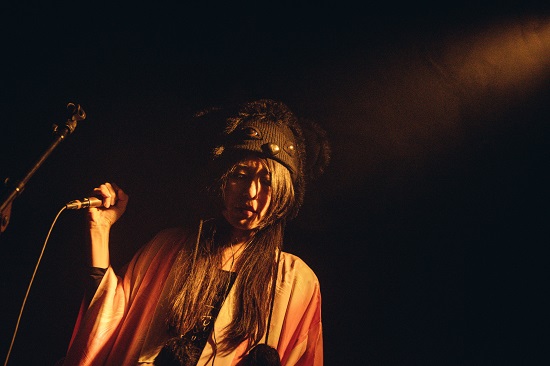
Can you tell me about the significance of rain and water as a constant image on the album?
RR: I think Kevin and I had a really hard time just before we started on this album because we’d both had children and there was a chance that both of them wouldn’t survive at one point. It was Kevin who alerted me to the fact that water was mentioned all the way through the lyrics. It hadn’t been that obvious to me because I’d been working on a song by song basis, just concentrating on the emotional content. But then Kevin mentioned it and I was like, “Really?” But I looked through the lyrics and saw that he was right. So all I can say is that it happened subconsciously and it’s related to birth and survival. That’s the only link I can think of. Sometimes the way we work is that I’ll send lyrics to Kevin and he’ll be like, ‘Meh.’ But this time the lyrics resonated with Kevin immediately.
KM: To be honest we hadn’t been in contact with Kiki that much in the last year because she was busy herself being a mum and [Roger and I] had these really intense times to get through. Apart from Roger and my mum there were very few people I was in touch with because I was trying to help my son survive. When we made the record it was just after all that, it hadn’t even caught up with us. We didn’t even talk about it. We were just very aware we wanted to make a record fast. The link to the rain and the sea… it just feels like I went through a very large journey in life in a very short time. When you realise about mortality and you break down so many times in an intensive care unit, crying your eyes out like a child, you realise the impossibility of the situation and you learn more about life than you had previously known. And it sounds like a grandiose statement but you realise how thin the line between life and death is, not just for you but for those close to you as well. It sounds like a really obvious thing to say but like with most intense emotional situations you have to be in the middle of that shit to have it resonate with you as a person.
RR: When I was writing the lyrics to the album my son was still in peril. While I was writing six of the songs, my son could have died at any moment but what I felt from it, when I was writing these songs, was just like a massive release. And that was a very personal thing but I felt like it was really helping me just release that tension. So I wrote a lot of the songs in that mood.
[Christian Fennesz joins us at the table]
Christian Fennesz: Isn’t it always like that with music? It’s the only thing that stays with me. It is the only medicine [in life]. Whatever you go through, it’s all just a very personal thing. But through the music you create this weird connection [with other people]. It is always very therapeutic to make music. To open your guitar case, to open up your laptop. I always feel that anything that allows you to dream has a therapeutic effect.
KM: I feel that the record is more connected to the seasons than to water. In terms of how I hear it.
CF: I did this record, Endless Summer and the word summer is irritating because what I actually always liked about summer was the fading away of it; the sense that Autumn is coming that you know it’s going to be over very soon. This is the right feeling.
But you couldn’t call the album Forever Autumn because Justin Hayward had already done it for Jeff Wayne’s War Of The Worlds. Do you think it’s inevitable that people who don’t know the biographical details of this LP will see it in terms of ecological catastrophe because of the dread and flood imagery? Like a sonic version of JG Ballard’s Drowned World?
KM: Rory Gibb mentioned this in his lead review for the Quietus. Well, coincidentally, I’m a massive fan of JG Ballard and was lucky enough to meet him – sort of. It was at a reading at a bookshop he did in London not long after I’d moved there. I was a fanboy and I was shitting myself at the idea of meeting him. I’d never had a book signed before in my life. I brought a cassette of a GOD rehearsal. [LAUGHS] So I recorded this cassette in the basement of a squat on one microphone – it was a cacophonous din. And my ex-girlfriend was like, “Go on! Go and get your book signed. Give him your cassette.” But I was too nervous, too shy. So I said, “Will you do it for me?” So I was lurking by the wall and I could see her give him the cassette and him having a giggle. And then she brought the book back to me and it said, “This is to the voice of God.” And then, even more incredibly, for me, there was a JG Ballard Re-Search annotated edition of The Atrocity Exhibition and he put a note in about the tape, saying: “At a reading in London recently I met the voice of God – a London pop band.” Pop band! For me this was the joy of joys because Ballard was like a god. I love all of his work and his ability to just flip the script with one sentence. He can set off a mind explosion with just a few words. So it’s interesting that you mention Ballard but until I read Rory’s review I hadn’t thought about any ecological overtones but that’s down to Roger lyrically anyway.
RR: You make a product and when you are making it you think about craft and you think about the art and you think about your emotions and you fold it down into a package. Then the person gets it and opens it up but they never open it up in exactly the same way that you folded it down. That’s why you have these different perceptions. It’s almost like I don’t like giving my perception of the album away because I want people to open up the package in their own way.
KM: What you have to remember is that when we collaborate with someone that has a massive effect on what we do. It was actually the sound library that Christian sent to me that was the biggest influence on how I started working on the music. We didn’t start with a sonic concept, it was Christian’s sound library that got the ball rolling. And it happened so fast compared to how I normally work. It was an absolute instinctive reaction to what he sent me, and his sound library comes with such a vast mood. [LAUGHS] It was like clouds coming over the internet to me. And I already knew from his records that he exists in a similar environment to me – a similar mindset.
RR: Christian just has to hit one chord and you’ll be like, “Oh God damn! That’s a beautiful chord.”
KM: Christian plays the guitar for sure but his instrument is actually emotion.
CF: But the emotion is tragedy!
KH: When he hit that first chord in soundcheck my heart just melted.
CF: But I always play the same chord!
ALL: [LAUGH]
CF: I’m going for a drink.
[Fennesz gets up and walks off]
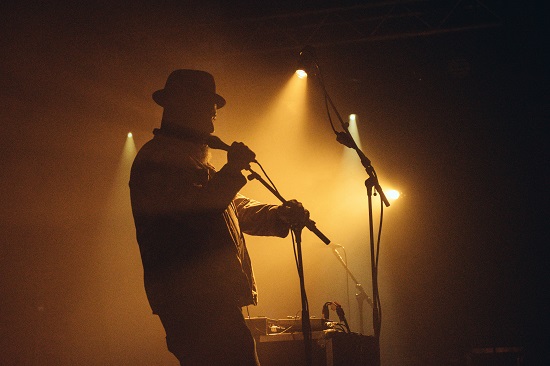
You’ve known Christian for quite a while haven’t you Kevin?
KM: Yeah, he used to turn up to Techno Animal and God shows in Vienna. He was a really nice guy but I didn’t know his music then.
[There is a general kerfuffle when Christian comes back to the table carrying a tiny espresso cup in one hand and a pint of lager in the other.]
KH: Rock & roll! Beer and espresso for breakfast!
KM: He’s more rock & roll than all of us put together.
CF: [DISMISSIVELY] I’m on tour… I’m so deaf today! I was using earplugs yesterday but I still can’t hear anything… I’m going to stand on the other side of the stage from Kevin in future.
Christian, you’re no stranger to collaborating with people, are there any rules of thumb you apply or do you do it on a case by case basis?
CF: It’s always different because people are different. For me the only thing that is the same is do I like the people or not. So many people have asked me to work with them but I don’t feel the chemistry.
KM: Did you feel the chemistry when I put half a grand in your bank account Christian? [LAUGHS] I should say for the record actually that there was no half a grand bung…
CF: Kevin and I have been talking about collaborating since the 90s but there has never been time. But I met the guys and it was a pleasure. They’re nice people to work with, to play music with, to hang out with.
People who will tolerate your lunchtime drinking?
CF: Well! I wouldn’t normally…
ALL [LAUGH]
How did the actual process work because I believe you did it remotely right?
CF: So sometimes when I work with people we hang out in the same studio and work together there but in this case it was just, I did my stuff, Kevin did his stuff. I would send him my stuff, he would work on it, produce it, send it back. I would listen to it. We would discuss it. And so on.
KM: Then I’d have to send him more money.
ALL: [LAUGH]
Kiki and Roger, it must be a challenge singing over Kevin normally but how about singing over Kevin and Christian?
RR: It’s quite a challenge. For me there are whole narratives contained in a song but that doesn’t mean the whole narrative for the song is going to play out live. If the volume gets to a certain point, that really determines the mood. Because the volume raises to points that are not pre-determined. Don’t fight the volume. Sing when you can sing. Sing up when the music starts raising until you stop being effective and at that point pull back. But they will give you space to put across the bit of the narrative that you need to get across. I’m thinking more that the voices are not just a means of delivering the narrative but another instrument.
KH: I feel the same as Roger. We used to fight to be heard. I have to sing on the chorus normally. I used to get the short end of the straw because I would have to sing on the noisy parts. So I used to put my vocal pedal on max and sing it at full power – like screaming it really. Well, maybe not screaming but certainly like a 90s rock singer. But now, for this new album, I feel more comfortable that I don’t have to battle against the music so I can concentrate on the emotional side of the performance. I think yesterday I literally couldn’t open my eyes, I was concentrating so hard on singing and during the last song I opened my eyes and looked at the audience to see what they were thinking. But for the rest of it, I was just concentrating solely on the emotion. And then when I opened my eyes… oof! There were so many people looking at me! I am more comfortable and confident in singing this new set.
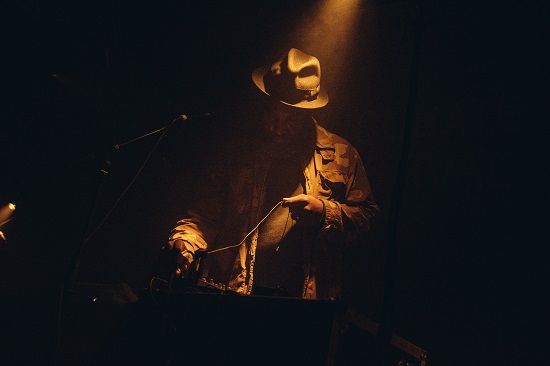
So, in the last two months, I’ve seen you perform with Dylan Carlson and Christian Fennesz and I was wondering if you’d developed a taste for working with groundbreaking guitarists?
KM: You know John… I fucking hated guitarists until recently. I’m not even joking.
RR: You like Justin [Broadrick]…
KM: Yeah, but Justin played his guitar like a rhythmic machine. You know for me I hated guitars for so many years because I had to listen to guitar solos by Rainbow, Santana, Deep Purple and Led Zeppelin…
CF: What’s your problem!?
KM: There were speakers piped into every room in my house when I was a kid and that’s why I liked post punk music because it meant that I didn’t have to listen to guitar solos. So the guitarists who I like most, play guitars that don’t sound like guitars. I don’t really hear what Christian plays as a guitar. I hear it as an emotion or I hear it as a colour.
CF: It’s basically a studio sound that I bring on stage, whether I’m using guitar or laptop. It’s just about the sound I want to create – it doesn’t necessarily have to come from a guitar, although sometimes I have to use a guitar to create it.
If you’ll forgive me I have a preposterous theory about King Midas Sound which I’d like to air now. I look at the band as being about the difficulty or even impossibility of love in the face of the pressures of modern urban life. I see parallels with Brazil – the Terry Gilliam film which states the only way that love can survive in a dystopian/ modern industrialised society is via the retreat into insanity – and Bladerunner which has a parallel narrative. I also sense a kinship to two particularly brutal but very different books – George Orwell’s 1984 and Mark Fisher’s Capitalist Realism…
KM: You know, there’s a movie called 2046 by Wong Kar-wai. It’s an incredible movie. And if there’s one film that really reflects the King Midas Sound it’s 2046. The plot is about a guy writing a science fiction story, but what he’s really concerned with is telling the story of the loves of his life. The conclusion of the film as such is that love is all about timing. You can think you’re with right person but it’s the wrong time. You can think you’re with the right person but the place is wrong. Or it can be the right time for you to fall in love but the person is wrong. It sounds obvious but it really struck a chord with me. For me, King Midas Sound is the most romantic music imaginable but it is all about the struggle to keep romance alive when we live in an increasingly cynical culture.
Edition 1 is out now on Ninja Tune

